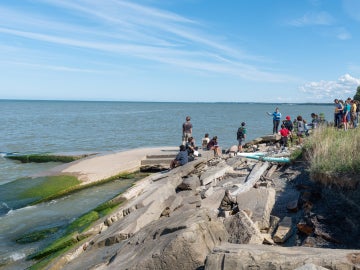Energy Research at the Federal Reserve: Emma Marshall ’18
March 6, 2020
Jaimie Yue ’22

Emma Marshall '18 visits Times Square in New York City during a trip with the Ashby Business Scholars.
Photo credit: Courtesy of Emma Marshall
Emma Marshall ’18 engaged in a variety of interests while at Oberlin. From learning about finance as a member of Ashby Business Scholars to spending a winter term tending cows, chickens, and sheep on Quarry Hill Farm in Pennsylvania, Marshall graduated with high honors in economics.
She currently is a research analyst at the Federal Reserve Bank of Dallas in the energy branch, which focuses on oil’s effect on the economy.
How has your experience at the Federal Reserve Bank of Dallas been so far?
There are two main parts of our team’s job: one is to produce research on oil-related topics, and the second is to brief the president of the Dallas Federal Reserve bank on the energy sector. During the day, I work with two other research analysts who are my age, and six economists. Together, we work with data to generate research ideas, write publications, develop models, and work on policy documentation for the president. It is hard for a research analyst to move up in their position without getting a PhD, so the typical path is to work for two years and then get a PhD. For this reason, my time at the Fed is almost over; however, my experience there has been incredible. Every day, I am exposed to new economic models and seminars with new research ideas, and I am surrounded by people with the same interests. It's a great environment to continue learning.
What do you enjoy about your current position or field of work more broadly?
My current position is unique because I get to work with economists as if they are my peers. They always ask if I have ideas about research and trust me to do the work. Additionally, I have access to so many tools to continue learning: seminars by famous economists, the opportunity to take more classes, and exposure to new programs. Economics is an interesting field because there are always more questions to answer with new models to help better understand a topic. There is never a lack of ideas to explore.
What was it like being an economics honors student while at Oberlin?
It was a lot of work! But also incredibly rewarding. Honors is stressful, difficult, and makes you rely on yourself a lot. Despite this, I have no regrets about participating. I grew as a person through this project because I figured out what I'm interested in, learned that I can push myself further than I realized, and worked through tough problems. I came out of the honors project with a full research paper, and I felt like I connected to the economics faculty in a way I couldn't have done otherwise. If you are interested in research, the honors program at Oberlin is a great place to try it out, because you have to think of an entire research idea yourself and work through it to completion.
Did any extracurricular activities or student jobs at Oberlin give you professional experience or build professional skills?
I was part of Ashby Business Scholars. That program helped me build my professional self. I was able to learn about finance and develop skills for working in a professional setting, but more importantly, I was able to connect with other like-minded students. I made connections to Oberlin students who had similar ambitions to me and they helped me talk through what I was interested in doing next. I also met a lot of alumni who have careers similar to what I would like to do. I still have their contact information and feel comfortable getting in touch with them if I ever need advice on my career path.
Did any professors or faculty at Oberlin particularly enhance your college experience?
I was extremely fortunate to have the help of the entire economics department when I was in the economics honors program. They answered questions for me about everything, from technical Stata questions to talking about what I wanted to do with my life. I was fortunate to have Professor Ron Cheung as my adviser because he was welcoming, friendly, talked through questions I had about careers or research, and helped support my decisions. He was actually my Econ 101 professor and was the first person to engage me in economics! I still keep in touch with a lot of the economics faculty.
What do you see yourself doing next?
I would like to go back to school at some point for a master’s degree, but at the moment I'm still exploring. I'm hoping to find a job next year that works with data, but is more interactive than research.
You may also like…
Research Roundup
Every day, Oberlin’s faculty and students produce scholarly work that uncovers new insights into how we understand the world, particularly in the areas of sustainability and the environment.
Walter Moak ’25 Earns Fulbright to Germany
The record-setting Oberlin athlete and musical studies major has earned a Fulbright English Teaching Assistantship (ETA) to Germany for the 2025-2026 academic year.
Alana Metcalf ’22 Earns Fulbright to Taiwan
The fellowship will help the psychology major achieve her goals of becoming a globally minded mental health professional.


